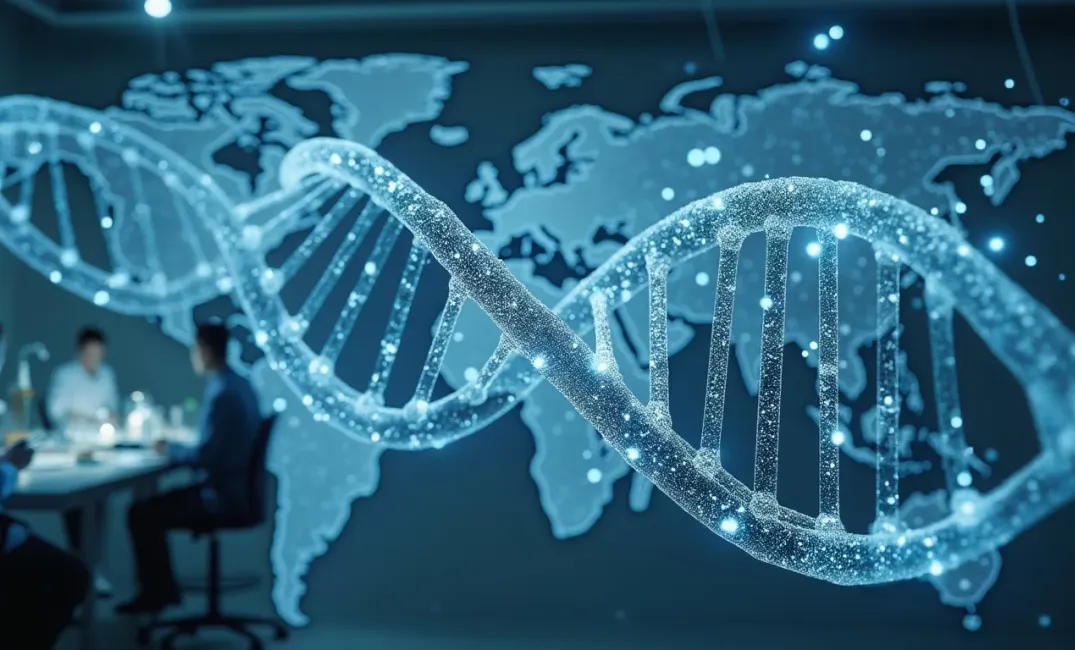Introduction: The Tapestry of Life
"It is not the strongest of the species that survives, nor the most intelligent, but the one most responsive to change." — Charles Darwin
Human genetics is a profound field that holds the keys to understanding our very essence—the intricate code of life written in DNA. From unraveling centuries-old enigmas of heredity to pioneering revolutionary medical breakthroughs, genetics shapes our health, society, and evolutionary trajectory. This entry explores the journey through genetic discovery, the ethical labyrinth it presents, and the boundless potential it offers to revolutionize health and society.
The Genesis of Genetic Understanding
Early Explorations and Mendelian Foundations
- Ancient Understandings: Early cultures speculated on inheritance, with theories ranging from mystical beliefs to rudimentary observations of traits passing from parent to offspring. Aristotle pondered bloodlines, while Hippocrates considered the transmission of "humors."
- Gregor Mendel's Peas: The 19th-century monk Gregor Mendel laid the foundation for modern genetics through experiments with pea plants, unveiling principles of inheritance—dominant and recessive characteristics—that formed the bedrock of genetic science.
The Double Helix: Breakthrough and Beyond
- DNA Discovery: The discovery of deoxyribonucleic acid (DNA) as the genetic material was a milestone. In 1953, James Watson and Francis Crick unveiled the double-helix model, revolutionizing biology by highlighting DNA's structure and replication process.
- Genetic Code Cracked: The subsequent decade witnessed the cracking of the genetic code, understanding how sequences of nucleotides correspond to amino acids, forming the proteins essential for life.
Mapping the Genome: The Human Genome Project
Pioneering Mapping Endeavors
- Launch and Legacy: Initiated in 1990, the Human Genome Project ambitiously aimed to map all human genes, profoundly transforming genetic research. By 2003, it was completed, identifying over 20,000 human genes.
- Technological Advances: The project cemented technologies that enabled genome sequencing, fostering fields like genomics, proteomics, and bioinformatics.
Implications and Innovations
- Medical Breakthroughs: Genome mapping has facilitated the identification of genetic markers for diseases, personalized medicine, and targeted therapies, offering tailored healthcare solutions.
- Genetic Counseling: Knowledge of genomes aids genetic counseling, allowing individuals and families to assess genetic risks, empowering informed health and reproductive choices.
Genetic Technologies: Altering the Blueprint
Genetic Editing and CRISPR Innovation
- CRISPR-Cas9: The revolutionary CRISPR-Cas9 technology enables precise gene-editing capabilities, offering potential cures for genetic disorders and enhancements in agricultural practices.
- Ethical and Safety Concerns: The advent of gene editing raises questions about potential misuse, ethical boundaries, and biosafety, necessitating robust regulatory frameworks.
Synthetic Biology
- Building Blocks of Life: Synthetic biology reconstructs biological parts, creating novel organisms with tailored functionalities. It holds promise for biofuels, medical applications, and addressing environmental challenges.
- Societal Impact: While synthetic biology offers remarkable opportunities, it also prompts societal dialogues on bioethics, potential ecological disruptions, and equitable access.
Genetic Research and Ethical Dimensions
Balancing Innovation and Ethics
- Gene Therapy Dilemmas: Gene therapy introduces new ethical considerations, including consent, accessibility, and the long-term effects of altering genetic blueprints for future generations.
- Genetic Discrimination: Decoding genomes must counteract potential discrimination based on genetic attributes in employment, insurance, and social dynamics.
Bioethics and Policy
- Global Governance: International bodies and ethical committees play crucial roles in shaping policies that consider cultural sensitivities while fostering scientific advancement responsibly.
- Public Engagement: Democratizing genetic research involves engaging public discourse, aligning scientific exploration with societal values through education and participation.
Genetics in Healthcare: Precision and Prevention
Toward Personalized Medicine
- Tailored Therapies: Precision medicine utilizes genetic data to optimize treatment plans, increasing effectiveness by selecting therapies aligned with individual genetic profiles.
- Preventative Practices: Genetic insights enable early detection of predispositions, emphasis on preventive healthcare, and lifestyle modifications to reduce disease risks.
Bridging Health Inequities
- Access to Innovation: While genetics heralds unparalleled health benefits, ensuring equitable access across socio-economic strata remains vital in overcoming disparities.
- Cultural Sensitivity: Genetic research must respect cultural and individual diversities, integrating indigenous knowledge and considerations to ensure inclusivity and fairness.
Future Horizons: Genetics Beyond Medicine
Evolutionary Perspectives
- Human Evolution: Genetic studies offer glimpses into human evolution, migration patterns, and adaptation mechanisms, enriching our understanding of ancestral roots and diversity.
- De-Extinction and Biodiversity: Advances in genetics may facilitate de-extinction efforts, raising philosophical considerations about humanity's role in altering natural history balances.
The Synthetic Frontier
- Artificial Life: As synthetic biology progresses, the creation of artificial life forms challenges philosophical, ethical, and existential queries about the essence of life and human uniqueness.
- Earth and Beyond: Genetic engineering may also aid in adapting humans and ecosystems for extraterrestrial habitats, igniting aspirations for interstellar existence.
Conclusion: Genetics as a Catalyst for Transformation
"There is grandeur in this view of life, with its several powers, having been originally breathed into a few forms or into one; and that, whilst this planet has gone cycling on according to the fixed law of gravity, from so simple a beginning endless forms most beautiful and most wonderful have been, and are being, evolved." — Charles Darwin
Human genetics stands at the frontier of discovery and ethical responsibility, unlocking unprecedented potential to redefine how we comprehend life, health, and our place in the cosmos. With a legacy anchored in curiosity and perseverance, the journey of genetics captures humanity's commitment to innovation while navigating moral imperatives. It is a reminder that, as creators and stewards of genetic knowledge, our choices etch the pathways of discovery and survival.
The evolution of genetics resonates as a narrative of transformation—a dance with the intricacies of life and the cosmos. As we peer into the essence of being, may we not only unravel the mysteries of life but illuminate paths to a future where health, equity, and potential harmonize within an ever-expanding tableau of human experience.
ETHICAL IMPLICATIONS, GENETICS, HUMAN GENOME PROJECT, HEALTHCARE INNOVATION, SYNTHETIC BIOLOGY, EVOLUTIONARY PERSPECTIVES, BIOETHICS, GENETIC TECHNOLOGIES, CRISPR, PERSONALIZED MEDICINE

